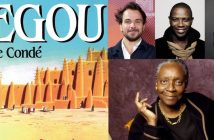How is it for you to be part of the Fabrique des Cinémas du Monde here at the Cannes Film Festival?
It’s such an honor being as part of the Cinémas du monde Pavilion a second time. It’s a privilege because I didn’t think that I would be invited back. This time, the program is much more devoted to developing projects than before, with the huge emphasis on projects and development, and finding coproducers or sales agents, even writing residencies.
Are you followed by professional and talented people?
Yes, in different areas: producers, sales agents, distributors who you pitch your project to. It’s a very firm foundation for figuring whether your script works first and foremost. And we had the honor of meeting Raoul Peck, who was the godfather for the Fabrique this year, and could go through the projects and give us candid one to one advice on how to improve the project. This is fantastic. And also facing conversations about whether or not the film is commercial, if it has legs, because often you start a project and you don’t know, because you are in isolation. We met people who give us feedback and people who are interested in working with us to develop the project: it’s something that you cannot find in Kenya.
Your producer is Steven Markovitz in South Africa : why not a producer in Kenya?
Steven was my executive producer on Pumzi, my short film. After that, I really wanted to work with him and I remember, I was in Berlin at the festival, and I asked him and he agreed. Thas was a blessing that we both thought that we can continue a relationship after. And because of our prolific years in working in different things, it was a great opportunity to team up. And I think that having two people of two different countries actually makes a project stronger, because it’s not just doing it: it feels important to make it, to grow the industry in the Continent. To have somebody like Steven believe in my project is a remarkable treat.
You produce films on one side, you direct films on the other side: how do you manage with these two caps?
Actually, I have only produced one short film in the African Metropolis Short Films Project: Homecoming, by Jim Chuchu. I really believed in his talent as a filmmaker. Very few filmmakers have the opportunity to go far enough with their project. Jim wants to continue to make films. It is a privilege to help him, but my passion is to write and direct films.
In this film, you tackle a delicate theme of love between two women. Why did you choose that subject?
When Steven said that he’d like us to work together, we decided to adapt a short story. We choosed Jambula Tree, which won the Caine Prize for short stories 2007. My first and foremost concern was to find a love story. This is what I wanted to do. When I came across Jambula Tree, because of the texture and the nuances, just the profound love that the main characters had to each other, I wanted to tell that story. Even though it’s a hard subject because it’s taboo, two girls falling in love with each other in a country where this is outlawed, it was very important for me to tell a love story because that’s what it is: how true love can triumph above anything. And I think, having been in many situations in my own life, the most courageous thing that anyone can do is to choose true love above one else and I think it takes a special kind of skills to choose true love that is difficult instead of what is expected.
Are there other films made on that subject in Kenya or Eastern Africa?
Some documentaries have been made, especially in Uganda, as you can get there the life in prison or death sentence. But this is the first feature film about the love between two girls to come out of Kenya.
What is the situation in Kenya?
In Kenya, for such a relationship, you may be sentenced 14 years of prison in a court. Culturally and socially there is a strong fight against it, which doesn’t make sense. I remember watching a debate a couple of years ago about whether homosexuality is African or European. Somebody had the most brilliant argument: he said that homosexuality is not unafrican; what is unafrican is homophobia. Because if we think that Africa is built on that ethos of Ubuntu, homophobia is against the idea of the community because you are ostracizing people of the community. It doesn’t go along with African ethos.
Are there organizations working on this in Kenya?
Yes, there is quite a few organizations working on sexual rights, human rights. There is a gay and lesbian association. Although they don’t have the space necessarily, they are creating places for that conversations to happen. A fringe benefit of the film is that it creates an opening, a normalcy for that kind of conversations to exist.
Do you already work with these organizations for the film?
It is too early because the project hasn’t been realized. We want to be very sensitive about the project before we shoot him. Later on, we want to involve them. They can use the film as a point of conversation, to help to sensitize the people to the issues the people of the gay community are facing.
But not for the scriptwriting?
No, I prefer to work alone because it is such a personal film, because it deals with taboo love, with difficult love. I want to be able to tell a story which is very personal first, without getting too many voices influencing, telling what the story should be or how it should told. I prefer to keep it close, so that it’s authentic. And then, after it’s made, it can take a life of its own and people can interpret it how they like.
How do you think it will be received in Kenya or other countries?
I think that in Kenya, it will be difficult. I guess that I have to wait till the film is done and see if the censorship’s board agree, how people rally for or against it. Every year we have the vagina monologs and a couple of these monologs are about women being with other women. Strangely enough, those particular monologs have been most successful. It also depends on the social classes: there is a big backslash on the gay and lesbian community in the working class areas.
Do you only want to focus your film on the true love story or do you also want tackle the question of the rights?
The story has universal potential but I want to concentrate on the love story. Even the girls themselves in the book were not expecting to fall in love with another girl. They are surprised. I don’t think that at the beginning of the journey, they would have said that they were lesbians. They just fell in love with another girl. They had then to define who they are and what they are. But they were going to have just a normal life. I want it to be a normal love story and I want people to appreciate it as a normal love story. And I want the people to see the difficulty that it is to choose a difficult love, whether it is between two girls, or two boys, or between different races or between different religions. You have to fight for it. That is the challenge. The hero is the person who is able to choose a difficult love.
In certain societies, the homosexuals have a certain role in the society. Is it the case in Kenya?
No, not in Kenya. There is no space like that. Although traditionally, as part of your initiation into adulthood, there have been particular customs in different nationalities that allow same sex relations so that you can begin to explore your sexuality without the fear of loosing your virginity. But with Christianity coming in, a lot of customs changed and the value based on the customs became corrupted in a way.
What is your place in the new cinema in Kenya?
There is a strong community of filmmakers in Kenya. The filmmakers I know are very supportive of my work and I am very supportive of their work. We have to support each other. I am very proud to be part of that because the industry is too small to be in competition. With one or two feature films coming out a year, there is no place to compete.
Do you have schools for cinema in Kenya?
It is just beginning and we don’t call them cinema schools yet. They work on a lot of documentaries and TV shows. They work on creative technicians, but I think it is a long way to go about creating the artists, with an artistic voice, whether you are a director or a sound designer.
And you have a film festival.
Yes, it lasts about two weeks and shows 150 films. We would need a more focused small film festival and then create a brand in the market which could grow.
And what about film critics?
One or two really count on their opinion. The fact that films come out is already an accomplishment in itself. People just appreciate the fact that it was made, and then don’t have much of a dialog about what the film and the story was. There is also space for that to happen, but it can only happen with more films coming through.
///Article N° : 11754










